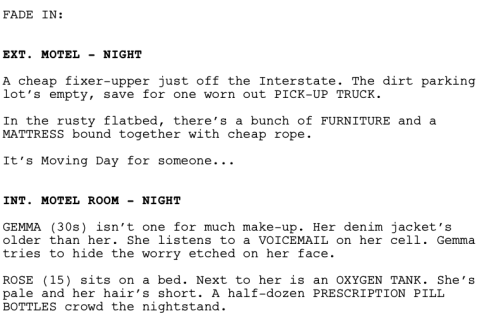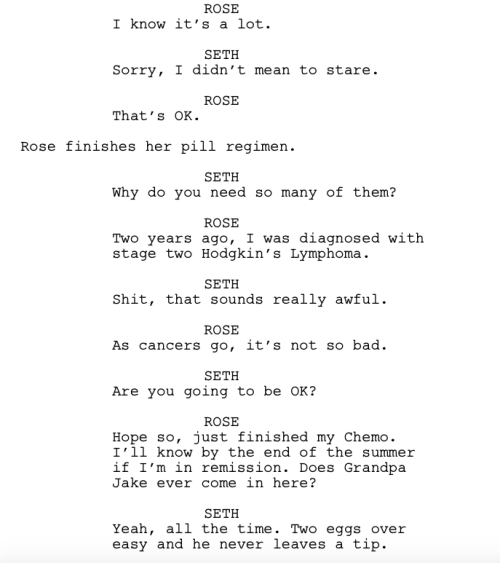Get Your Script Reviewed On Scriptshadow!: To submit your script for an Amateur Review, send in a PDF of your script, along with the title, genre, logline, and finally, something interesting about yourself and/or your script that you’d like us to post along with the script if reviewed. Use my submission address please: Carsonreeves3@gmail.com. Remember that your script will be posted. If you’re nervous about the effects of a bad review, feel free to use an alias name and/or title. It’s a good idea to resubmit every couple of weeks so your submission stays near the top.
Genre: Thriller/Lifetime (Made-For-TV)
Premise (from writer): When her homecoming ends in tragedy, a desperate single mother spins a web of lies to protect the family nursery from a ruthless property developer.
Why You Should Read (from writer): Breaking into the industry through Lifetime MoW (Movie of the Week) means is legit. Many writers have started out there and transitioned into feature films. It’s a subject we’ve never covered on Scriptshadow in my 4 years there. We’re always focused on high concept studio-oriented stuff. Why not made-for-TV? That career path would make for an interesting discussion in your blog.
Writer: Brett Martin (Electric Dreamer)
Details: 105 pages (note: This is an updated draft from the one posted on Amateur Offerings) – Edit: I’ve been informed that I read the OLD draft. Take that into consideration when reading the review. Sorry about that, Brett!

Long-time commenter and awesome community member, Electric Dreamer, has bestowed upon the Scriptshadow community a challenge heretofore unknown to the reader faithful. To review a made-for-TV screenplay.
We talk about genre scripts and Oscar hopefuls and giant spec sales all the time, ignoring the fact that there’s a huge industry that exists below the line where writers make a living on, let’s just be honest here, guilty pleasure TV flicks. “The Day Janie Left” doesn’t just write itself, you know.
So I thought today’s review could double as primer for the made-for-TV world. If you want to play in the sandbox where the sand isn’t as deep, where you can develop your skills before moving up to the big leagues, then Made-For-TV might be for you. Let’s check out Electric’s “Reap What You Sow” to see what these films are all about.
30-something Gemma has just arrived back in her home town with her 15 year old cancer-stricken daughter, Rose. The two are flat broke and from the bits and pieces of their conversation we’re privy to, it sounds like Gemma is hoping to reconnect with her father, possibly even stay with him, a difficult decision since he’s always been an abusive alcoholic.
But when Gemma shows up at her childhood home, her father is dead, his neck pierced with a broken whiskey bottle. It would appear that he had a drunken accident.
OR DID HE???
When studly Sheriff and former Gemma boyfriend Carl Baxter comes to take a look at the mess, he’s not convinced that this was an accident. In fact, he’s suspicious of the fresh bruises that have appeared around Gemma’s neck.
COULD GEMMA HAVE MURDERED HER FATHER???
While Carl turns the dad’s death into an official murder investigation, Gemma learns that the richest man in town, Walt Sharpe, was just about to close a deal to buy Gemma’s house. It doesn’t take Gemma long to realize that Sharpe wants to build some giant resort, and that her father’s house is right in the middle of it.
Apparently, when the dad died, the contract disappeared. So Walt employs his right hand man, Butch Garner, to form a relationship with Gemma, allowing him access to the house where he might possibly locate this missing contract.
But then Butch starts to actually like Gemma, and everything gets redonkulous. This forces the increasingly psychotic Walt to try and get the house through other means. And through that pursuit, we learn the shocking truth behind who killed Gemma’s father.
Okay, I’m going to start off with some advice right out of the gate. Brett sent me a new version of his script, in which he says he completely rewrote the first 12 pages. I COULD TELL. And this is why I warn writers away from doing massive changes at the last second.
Screenplays are odd beasts. They don’t operate under the known laws of physics. You can look at a change you just made and think, “Wow, I really nailed that. That’s so much better than what I had before.” Then you pick up your script a week later, read the same scene, and it’s like a mentally challenged fifth grader hijacked your script.
What happened?
What happened was TIME. Time allows perspective. When you rush, you don’t have perspective. You can’t see how the changes fit into the larger picture yet.
That’s clearly what happened here because once the script got going, it was fine. It was only the first few scenes that had me confused. For example, here’s the first half-page.
So we’re at a motel. Then we’re told of furniture and a mattress outside and that “It’s Moving Day for someone…” Is this an off-the-cuff description to add color to the writing? Or is this referring to specific character(s) we’re about to meet?
This early in a script, before you’ve identified the style or voice of the writer, you have to assume that everything is being written with a purpose. Therefore, I’ll assume the “moving” has to do with our characters (Gemma and Rose). But if it’s “moving day,” why aren’t they moving from their home? Why are we at a motel?
Maybe they’re in the process of moving? Like they’re on one leg of the journey? Except in the scenes that follow, there’s no actual moving that occurs. The point is, I’m stuck trying to figure something out that should be obvious. And I believe this mistake was made because of rushed writing.
I point this out in my book as one of my tips. Don’t make a lot of changes right before you send your script out. Something’s bound to get screwed up.
Moving on. Reap What You Sow is a very tight story. One thing I’ve realized about the Lifetime/Hallmark movies is that because they embrace formula so openly, they’re perfect for the GSU (Goal, Stakes, Urgency) approach. These movies DESPERATELY want you to use this formula. And they don’t care if it’s transparent.
So here Gemma has a goal – she has to get her late father’s garden/landscaping business up and running to secure the house. The stakes are if she fails, she loses the house. And the urgency is that she only has a month to do it or else Walt gets the home.
But Brett didn’t stop there. Brett use something I like to call GSU-squared (or even GSU-cubed). This is when you give GSU to EVERY SINGLE MAJOR CHARACTER IN YOUR SCRIPT.
So we know Gemma’s GSU plight. But we also have Walt’s. His goal is to get the house from Gemma. The stakes are that if he fails, he can’t build his super-resort. And the urgency is the same time frame that Gemma’s got (since they’re working off the same ticking time bomb – one month).
Then you have Butch. Butch’s goal is to find the contract. The stakes are his standing in Walt’s company. And the urgency is the same (1 month).
By giving every character GSU, your script is always MOVING. Whenever we cut to a character, they have something they’re trying to achieve. And because of “S” (stakes), that something is always important.
If you’ve ever found yourself cutting to characters and they feel boring or static, chances are it’s because they don’t have a goal, or there are no stakes attached to their goal, or there’s no time constraint involved in their journey. Give a character GSU and they instantly come alive.
So Brett did a really good job there.
But where Reap What You Sow runs into problems is in its dialogue. And maybe this is because I don’t understand the expectations for dialogue in made-for-TV movies (the extent of my made-for-TV watching is limited to Mommy Dearest), but whether their expectations are low or not, there wasn’t enough LIFE in these words. Here’s a sampling from a scene in which Rose’s new crush, Seth, stares at her oxygen get-up.
It felt like dialogue. It never felt like people talking. And I think that’s because Brett didn’t know his characters well enough. Rose, in particular, seemed like she was only there to add financial strife to Gemma’s situation. I never saw her as a real person. And when you don’t get to know your characters, you don’t learn their little idiosyncrices, their fears and reservations – the things that inform how a person speaks.
For example, I read a script not long ago where a meathead character would pepper his speech with “you know” every five seconds, even when he didn’t need to. Or, to compare similar characters, there’s the character of Emma in the TV show, The Bates Motel. Like Rose, she needs a breathing apparatus.
Emma is infatuated with Norman, so every part of the way she speaks is geared towards pleasing him, impressing him, trying to get him to notice her. There’s a neediness to her speech pattern that brings her dialogue alive. Here in “Reap What You Sow,” characters speak mainly to move plot along or give opinions about things (i.e. “I don’t like Butch.”). There’s a lack of naturalism and a lack of fun to the dialogue.
And I don’t think this being a TV movie should be an excuse to write less-interesting dialogue. Sure, the dialogue’s probably going to be more on-the-nose than in, say, a David Fincher film, but you should still try to be on-the-nose with some flair.
I guess the best way to sum up my reaction to the dialogue here is that it felt like Brett was bored writing it. I want him to write a version where it feels like he’s having fun. And isn’t that what Lifetime wants anyway? Don’t they want a little cheese? A little goofiness? A little flash?
It’s nearly impossible for me to give a rating here because I’m trying to rate something that embraces a lower quality product. And while I definitely thought there was a lot to celebrate, the story wasn’t challenging enough to keep me engaged. That and the dialogue were what kept this from being “worth the read.”
With that said, I feel like Brett achieved what he set out to do, and I don’t see his script as being that far behind what Lifetime puts on the air. What did you guys think?
Script link: Reap What You Sow (new version)
[ ] what the hell did I just read?
[x] wasn’t for me
[ ] worth the read
[ ] impressive
[ ] genius
What I learned: Brett hooked me up with a couple of writers who have operated in the Made-For-TV-Movie world. After promising each of them a box of Sprinkles cupcakes, they’ve shared with me some trade secrets. They say that Hallmark responds to scripts that promote the wholesome, family love, uplifting thing. While Lifetime is a little more varied. They prefer the tawdry woman in danger scenario. But also like domestic strife, standing up to invaders, and the storybook romance (an old flame rekindled). Any made-for-TV movie fans here? What other secrets can you tell us!?



